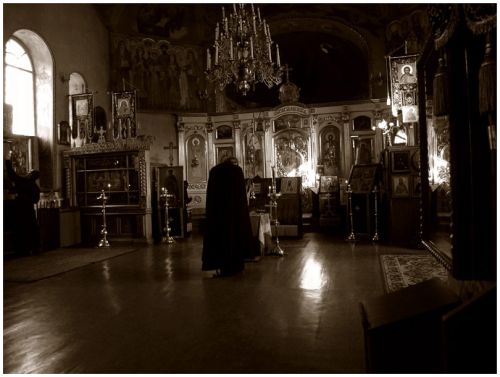Source: Saint Aidan Orthodox Church
Recently, the pastor of another community, a man for whom I have the greatest respect, invited my parishioners and I to celebrate a Sunday morning service with his congregation. Sadly, I had to decline. The reasons for this were firstly practical. Combining two very different kinds of services—one Eastern Orthodox, the other Protestant—without losing the integrity of each would prove too difficult, if not impossible.
The other issue, though, was more profound. Before he and I could even face the complications of combining style and content, we would have to face the fact that our very definitions of what constitutes worship are different. Without this common understanding, what would it even mean to ‘worship’ together, anyway?
Is worship praise and song, as in hymns or choruses? Is worship preaching and teaching, as in a sermon or a testimonial? Is worship prayer, as in praying collectively for others or the world? Does worship involve Eucharistic communion? If you had just a sermon, or just hymns or just communal prayer by themselves, would it still be worship, or does worship require certain elements to be deemed worship?
These are questions many Christians have grappled with for at least five hundred years. Various answers have been put forward, resulting in the current plethora of Christian practices across the denominational spectrum.

Faced with this diversity (some might call it confusion), many choose to respond in the spirit of religious pluralism. Too frequently, people visiting Saint Aidan’s have said to me, “We all worship the same God, but it’s so nice to see other styles of worship…” Frankly, this is a cop out. Confronted by differences in worship and not wanting to deal with the issues, we tend to become vague and fuzzy, and simply choose to believe that because a group of people gather together, sing, pray and listen to a teaching or meditation, they must be engaging in worship, whatever its flavour. If the definition is vague enough, we believe, then we will all get along and live happily ever after.
I wish that were true. The fact is, Christians and indeed all people of faith, cannot worship together meaningfully or effectively unless they have come to a consensus on what it is exactly they are doing. To simply assemble and perform a common order of service together, without really agreeing on what is happening, and to call the result ‘worshiping together’ is just not accurate. Diners in a Smorgasbord restaurant may be eating food in the same place, but to what extent are they sharing a communal meal?
No, the question of what exactly is worship must be faced and answered if people of faith are ever going to worship together. The solution, in my opinion, is not that complicated. We must return to our common roots. If we believe in a God who is unchanging, shouldn’t the worship of that God also be essential unchanging? Indeed, for as long as our race has existed, human beings have understood worship as possessing a very specific characteristic that bears rediscovering in our own communities: sacrifice.
Worship has always been sacrificial. Put in simple terms, the reasoning behind this is as follows:
A) Something is wrong with the world as it is, and we are somehow responsible.
B) There is some Power beyond our own capable of restoring things to their proper state.
C) We offer that Power something crucial to our own lives, to demonstrate our dependence on divine intervention.
This is sacrifice. We give up something important (usually the food and drink that keeps us alive, or else the time and the money that allows us to provide for the basic needs of ourselves and our families), so that we can demonstrate that we need divine intervention to restore, fulfil, and preserve our lives.
Sacrifice is an affirmation that God is God, and we are not. When we sacrifice, we come to the Power greater than ourselves and give up things that are important to us in the hope that this God will respond by taking care of us. The act of sacrificing is painful and difficult, and it should be. It feels like death, because it is.
Whatever else worship is (and much more may be said), it is first and foremost sacrifice. Too regularly, I see churches catering to their congregations, making God attractive, palatable and easy to digest, with more comfortable or pleasant surroundings and activities, softer and less challenging messages, and greater perks for attendance (would you like a Grande Latte and pastry with that sermon?).
If we are ever to make a start on the journey back to truly worshiping the same God, we first need to agree that worship involves people coming to God on His terms, not Him coming to us on our terms. Worship should not be a pleasant or comfortable experience. It should deprive us of vital resources. It should challenge and drain us, leaving us empty and ready to receive the life that God alone has to give.
The desert elders of the Eastern Orthodox tradition have a saying: “Give God your blood and He will give you His spirit.” Hard as it may be to hear, the true worship of God demands a total sacrifice of ourselves, our comforts and conveniences, our assumptions and agendas. Any less an effort is simply our backhanded way of saying that God is just not worth the effort because He is not really the ultimate Giver of life. Worshiping God, or denying God—maybe it’s time to take a closer look at what we’re really doing.
















